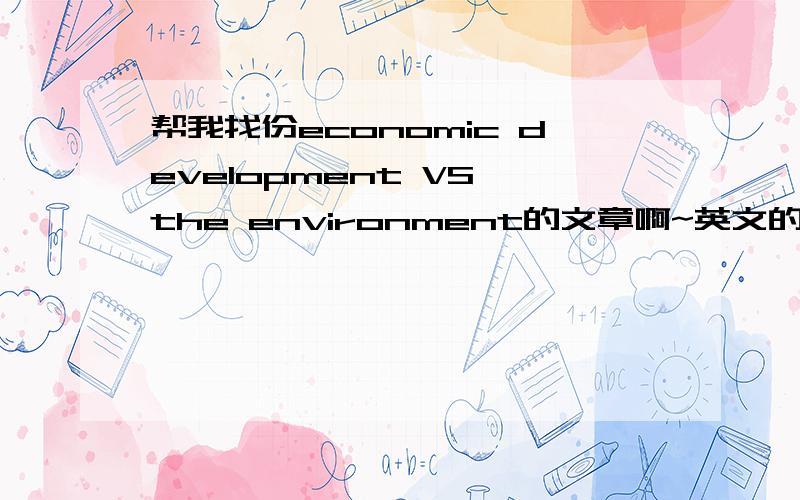帮我找份economic development VS the environment的文章啊~英文的~
来源:学生作业帮助网 编辑:作业帮 时间:2024/04/29 04:08:56

帮我找份economic development VS the environment的文章啊~英文的~
帮我找份economic development VS the environment的文章啊~英文的~
帮我找份economic development VS the environment的文章啊~英文的~
The annual Earth Day celebration predictably prompts politicians to tout their environmental credentials,but experts question.
whether environmental issues have much of an effect on presidential voting.
Even among younger voters,who typically express more interest in preserving,the environment than their elders,the "greenness" of a presidential candidate is less important this year than in the past.
>
Still,the coming of Earth Day,every April 22 since its creation in 1970,focuses public attention on protecting the planet and assessing the eco-friendliness of the White House occupants and aspirants.
This year,"for some of those voters,the environment,public health issues,clean air,clean water could be very important," Carol Browner,director
of the Environmental Protection Agency under former President Clinton,said in a conference call with reporters this week.An annual Earth Day poll by The Gallup Organization this week found that
> Americans are less worried today about the environment than they have been in the past.The shift "may reflect the tough economic situation facing
the country in the past few years," noted Gallup's analyst,Lydia Saad.
>
> Indeed,when asked whether environmental protection or economic growth should be given priority when the two interests conflict,a record low number of Americans have chosen environmental protection in each of the
last two years -- 49 percent this year,47 percent in 2003.
>
> Moreover,in the latest poll,just 8 percent cited the environment as the most important issue facing the country in the next 25 years,down from 14 percent four years ago.
>
> Nonetheless,Americans give the environment a more negative assessment now than in previous years.Fifty-seven percent rate the quality of the
nation's environment today as "fair" or "poor," a jump of 5 percent since
President Bush took office.
>
> In a recent poll of college students by Harvard's Institute of Politics,just 2 percent said the environment concerns them "the most," well beyond the war on terrorism and in Iraq (21 percent) and the economy (20
percent).
>
> In the past,some pollsters have found sizeable majorities of 18- to 30-year-olds who ranked the environment above encouraging economic growth.
Environmental Protection Versus Economic Development:A False Trade-Off?
Ronald C.Feiock & Christopher Stream1Florida State University,2University of Idaho
Abstract
Is a trade-off between the social benefits of regulation and the economic benefits of development inevitable?We argue that environmental regulation may deter economic growth in some contexts,however,in other contexts the benefits of regulation may be obtained with little or no economic loss.We develop an explanation of the economic impacts of state environmental policy based on a model of public influence on private resource allocation decisions.In this model,we assume utility-maximizing firms will make investment choices based upon the projected profits on their investments and their willingness to accept the risk associated with the investments.We assert that state policies and administrative institutions influence perceptions of risk by increasing or decreasing uncertainty over future environmental policy and influence return on investments at particular locations by affecting firm-level production costs.Our results confirm that certain administrative arrangements for environmental regulation may enhance,rather than impede,economic development.